高中英语:Module 4 Which English--Speaking-Reading and Vocabulary (2)-Writing-Task(外研 module4)
外研版高中英语必修2---Module4教案设计
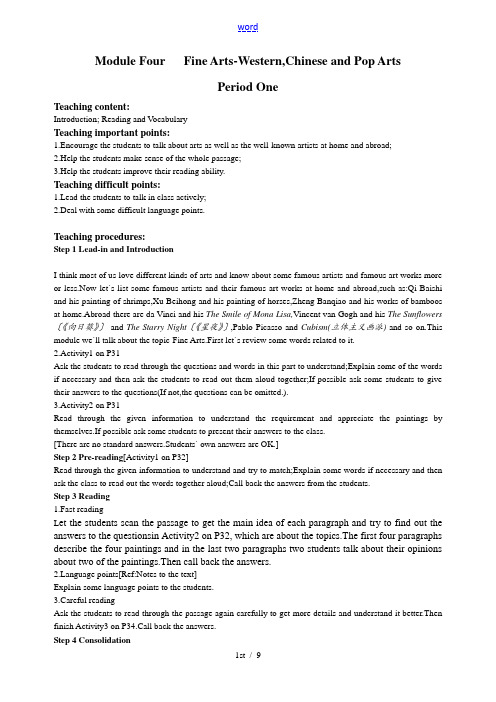
Module Four Fine Arts-Western,Chinese and Pop ArtsPeriod OneTeaching content:Introduction; Reading and V ocabularyTeaching important points:1.Encourage the students to talk about arts as well as the well-known artists at home and abroad;2.Help the students make sense of the whole passage;3.Help the students improve their reading ability.Teaching difficult points:1.Lead the students to talk in class actively;2.Deal with some difficult language points.Teaching procedures:Step 1 Lead-in and IntroductionI think most of us love different kinds of arts and know about some famous artists and famous art works more or less.Now let`s list some famous artists and their famous art works at home and abroad,such as:Qi Baishi and his painting of shrimps,Xu Beihong and his painting of horses,Zheng Banqiao and his works of bamboos at home.Abroad there are da Vinci and his The Smile of Mona Lisa,Vincent van Gogh and his The Sunflowers 〔《向日葵》〕and The Starry Night〔《星夜》〕,Pablo Picasso and Cubism(立体主义画派) and so on.This module we`ll talk about the topic-Fine Arts.First let`s review some words related to it.2.Activity1 on P31Ask the students to read through the questions and words in this part to understand;Explain some of the words if necessary and then ask the students to read out them aloud together;If possible ask some students to give their answers to the questions(If not,the questions can be omitted.).3.Activity2 on P31Read through the given information to understand the requirement and appreciate the paintings by themselves.If possible ask some students to present their answers to the class.[There are no standard answers.Students` own answers are OK.]Step 2 Pre-reading[Activity1 on P32]Read through the given information to understand and try to match;Explain some words if necessary and then ask the class to read out the words together aloud;Call back the answers from the students.Step 3 Reading1.Fast readingL et the students scan the passage to get the main idea of each paragraph and try to find out the answers to the questionsin Activity2 on P32, which are about the topics.The first four paragraphs describe the four paintings and in the last two paragraphs two students talk about their opinions about two of the paintings.Then call back the answers.nguage points[Ref:Notes to the text]Explain some language points to the students.3.Careful readingAsk the students to read through the passage again carefully to get more details and understand it better.Then finish Activity3 on P34.Call back the answers.Step 4 ConsolidationTime permitting,let the students listen to the tape and follow it quietly to understand the text further.Step 5 Summary and Homework1.Summary: Summarize what they have learned in this period.2.Homework: Reading on P88-89 in workbook.Appendix: Notes to the text1.…that aimed to show ordinary twentieth-century city life.aim to do sth. 打算做某事,目的是[aim vi. 打算]eg:They are aiming to reduce unemployment by 50%.We aim to be there around six.我们力争六点钟左右到那里。
高一英语外研版必修4module4教案
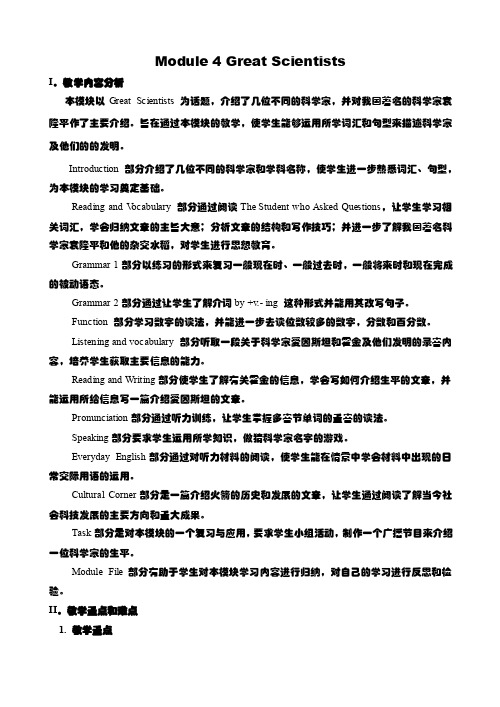
Module 4 Great ScientistsI.教学内容分析本模块以Great Scientists 为话题,介绍了几位不同的科学家,并对我国著名的科学家袁隆平作了主要介绍。
旨在通过本模块的教学,使学生能够运用所学词汇和句型来描述科学家及他们的的发明。
Introduction 部分介绍了几位不同的科学家和学科名称,使学生进一步熟悉词汇、句型,为本模块的学习奠定基础。
Reading and V ocabulary 部分通过阅读The Student who Asked Questions,让学生学习相关词汇,学会归纳文章的主旨大意;分析文章的结构和写作技巧;并进一步了解我国著名科学家袁隆平和他的杂交水稻,对学生进行思想教育。
Grammar 1部分以练习的形式来复习一般现在时、一般过去时,一般将来时和现在完成的被动语态。
Grammar 2部分通过让学生了解介词by +v.- ing 这种形式并能用其改写句子。
Function 部分学习数字的读法,并能进一步去读位数较多的数字,分数和百分数。
Listening and vocabulary 部分听取一段关于科学家爱因斯坦和霍金及他们发明的录音内容,培养学生获取主要信息的能力。
Reading and Writing部分使学生了解有关霍金的信息,学会写如何介绍生平的文章,并能运用所给信息写一篇介绍爱因斯坦的文章。
Pronunciation部分通过听力训练,让学生掌握多音节单词的重音的读法。
Speaking部分要求学生运用所学知识,做猜科学家名字的游戏。
Everyday English部分通过对听力材料的阅读,使学生能在情景中学会材料中出现的日常交际用语的运用。
Cultural Corner部分是一篇介绍火箭的历史和发展的文章,让学生通过阅读了解当今社会科技发展的主要方向和重大成果。
Task部分是对本模块的一个复习与应用,要求学生小组活动,制作一个广播节目来介绍一位科学家的生平。
外研版高一英语必修四unit4语法课教案设计

Lesson plan for Great ScientistsTeachi ng Procedurese.The new hybrid rice has been developed by the Yuan Longping High-tech Agriculture Company of China.T:Now answer the following questions.1 .Which sentence is in the present simple(passive voice)?2 .Which sentences are in the past simple(passive voice)?3 .Which sentence refers to the future?4 .Which sentence is in the present perfect?3. Present the passive voice with four tenses on PPT the present simple, the past simple, the futuresimple, and the present perfect; then explain the usage of the sentences from the PPT one by one.4. Conclude the forms of the passive voice and show it on PPT. Let Ss learn to observe the sentences structures and distinguish the different tenses.The teacher guides the students to make a simple summary of the voice they have learned and form a clear concept of it.Stage 3 Practice (10mins)1. Ask Ss to do the exercise 1 and exercise 2 of different tenses about the passive voice. 厂 一Exercise 1 J 1.1 vxltfl monry ______ . Ihe lliedltv illA. was fnundB. find 吊 1 round Ik fonrid«rv cnnriiJ<nt ihiHenvironment _______ hy our furthervl'Jbrh tu induct pullulion.A. had been improved ' hr iniproi «dC?. k impiwcd 1). WHS improvrdXU nalliing _______ , Uiv(K?c3ns «111 turn inlo I LS J I deserts,A. doe\ B* h 刘d been done will 号 JuneExercise 2Fill in the blanks.Part oneLihui: Let's learn other scientists.Lihua: Cailun is a great inventor I'd like to talk.Lihui: Great,we all know that Papermaking _____________________ (invent) by him.Lihua:Yes,with the development of society, different types of paper _____________________ (develope) sofar.Lihui:Maybe in the future, new paper ________________ (create) and ________ (use) in other area.Part 2Tom:Do you know some famous scientists?Tina:Yes,Stephen Hawking,he _________________ (know) at home and abroad widely.Tom:for example?Tina:He ___________ (graduate) from Oxford University.In the 1960s,He (diagnose)with motor neurone disease.but he never gave up, his book A Briefbe +doneDesigning purposeHistory of Time(publish)in 1988.He is so outstanding and we(influence) by him.Tom:Right.we all believe his work(use) in other new field that(explore) by others scientists recently.Stage4 Production Discussion and making sentences in groups.(11 mins ) 1.Teacher show some pictures in the PPT, then ask Ss to discuss and describe the picture byusing the correct form of passive voice in groups. And some prompts are given besides the picture.T: I think you have learned passive voice by hearts. Now, we will make some sentences in passive voice inpassive voice.You know,we should learn not only their forms but also how to use them correctly. Ask Ss todiscuss the exercise in groups and finish it.Practice 1: Make sentences according to the pictures and given words.2.Write a short dialogue within sive sentences to describe the scientists with the right types of PV.Scientists are as follows:MadameCurie,Edison ect.3.Give some comments on the Ss' performance and then give a brief conclusion.Blackboard/PPT Design(板书 /媒体设计)Module 4 The Passive VoiceBe+done1.the present simple: am/is/are+done2.the past simple: was/were+done3.the future simple: will be+done4.the present perfect: have/has+been+done。
外研版选修8-4listening and speaking,everyday English

problem.
MAN What’s that mean, a technical problem? Have the wings fallen or something? Can’t you give me a_s_tr_a_i_g_h_t_a_n_s_w_e_r_, and just say what’s happened?
• asked him his opinions about the matter.
Speaking
Speaking—1 Work in pairs and discuss these questions.
1. Can you hear the difference between different accents in English? 2. What do you think the differences are? For example, do you think American and British speakers of English pronounce any sounds differently?
3. How does the man sound (angry, happy etc.)? Students’ own answer. Conversation 2 4. Where does the woman want to go? To the hospital. 5. What has happened to the bus? It got held up in traffic.
4. It doesn’t matter means that something is OK/ not OK. 5. A straight answer is clear and easy to understand/ long and difficult to understand.
外研版高中英语必修五课件:Module+4+第四单元

课时
板块结合范例
Period 1 Introduction + Reading and Vocabulary
Period 2 Period 3 Period 4
Grammar
Listening and Vocabulary + Function +Everyday English
Reading and writing+ Culture corner
Period 1
Module 4 Carnival
Introduction +Reading and Vocabulary
Introduction – 1. Guessing (3m) Guess the festivals with the descriptions.
1. This is a Christian festival which comes form the middle of the winter.
revived? And by whom? 7. Is the spirit of Venice carnival the same as the great
American carnivals?
Reading & Vocabulary –2 . Detailed-reading
Key to the answers:
Things you may do
eat especial food. give or receive gifts wear special clothes. dance and listen to music. have a holiday from school. take part in a traditional ceremony. enjoy yourself with friends or family.
Unit 4 定语从句讲义 2021-2022学年外研版高中英语必修第一册
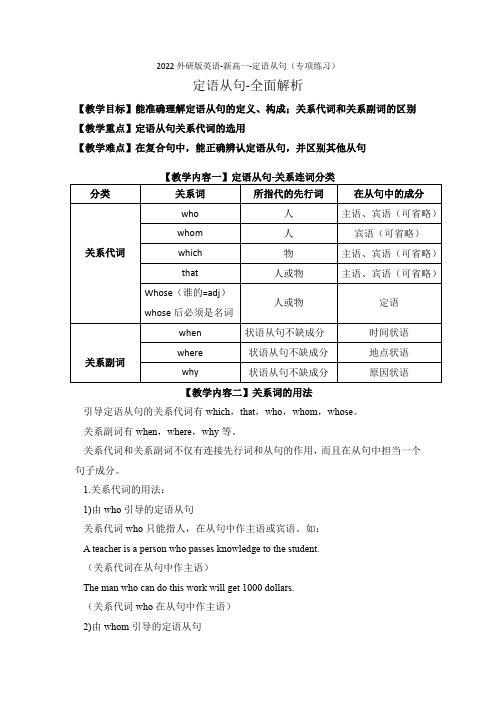
2022外研版英语-新高一-定语从句(专项练习)定语从句-全面解析【教学目标】能准确理解定语从句的定义、构成;关系代词和关系副词的区别【教学重点】定语从句关系代词的选用【教学难点】在复合句中,能正确辨认定语从句,并区别其他从句【教学内容一】定语从句-关系连词分类分类关系词所指代的先行词在从句中的成分关系代词who人主语、宾语(可省略)whom人宾语(可省略)which物主语、宾语(可省略)that人或物主语、宾语(可省略)Whose(谁的=adj)whose后必须是名词人或物定语关系副词when状语从句不缺成分时间状语where状语从句不缺成分地点状语why状语从句不缺成分原因状语【教学内容二】关系词的用法引导定语从句的关系代词有which,that,who,whom,whose。
关系副词有when,where,why等。
关系代词和关系副词不仅有连接先行词和从句的作用,而且在从句中担当一个句子成分。
1.关系代词的用法:1)由who引导的定语从句关系代词who只能指人,在从句中作主语或宾语。
如:A teacher is a person who passes knowledge to the student.(关系代词在从句中作主语)The man who can do this work will get 1000 dollars.(关系代词who在从句中作主语)2)由whom引导的定语从句关系代词whom只能指人,是who的宾格,在从句中作宾语,在口语中常常省略。
如:The man whom you met on the street is my father.(关系代词who在从句中作宾语,可以省略)The woman (whom)you talked with yesterday will come here the day after tomorrow.(关系代词whom在从句中作宾语,可以省略)3)由that引导的定语从句关系代词that在从句中既可以作主语,又可作宾语;既可指人,又可指物。
Unit4+Sharing语法2022-2023学年高中英语人教版2019选择性必修第四册

Chapter 1 of sharing --- Look and Answer
What happened in the picture?
Rescue teams tried their best to search people.
In the rubble(碎石) of collapsed buildings, rescue workers and medical teams searched for both survivors and those killed. With thousands of collapsed buildings, it is not clear how many people might still be trapped under the rubble.
6. My muscles① were aching② and my knees③ shaking as we dragged ourselves④ down the mountain⑤ towards home⑥.
①NP (subject),② VP(predicate), ③ NP (subject), ④ VP (predicate), ⑤PrepP (adverbial) , ⑥ PrepP (adverbial)
Identify the Phrases and Analyse Their Functions
3. Tombe’s father①, Mukap, a man② with a strong jaw and a wrinkled forehead③, led us④ to his house⑤.
①NP (subject) , ②NP (appositive), ③PrepP (attributive) , ④VP (predicate) , ⑤PrepP (adverbial) 4. He then placed the hot stones① in an empty oil drum② with kau kau (sweet potato), ripe corn, and greens③. ①VP (predicate), ②PrepP (adverbial), ③PrepP (adverbial)
外研版高中英语选修6-11课本目录(义务教育教科书)

高二英语选修6电子课本目录MODULE 1 Small TalkINTRODUCTIONVOCABULARY AND READINGFUNCTIONREADING AND LISTENINGGRAMMARREADING AND WRITINGREADING AND VOCABULARYEVERYDAY ENGLISHREADING PRACTICECULTURAL CORNERTASKModul e FileMODULE 2 Fantasy LiteratureINTRODUCTIONREADING AND VOCABULARYGRAMMARSPEAKINGLISTENING AND VOCABULARYGRAMMARFUNCTIONSPEAKINGVOCABULARY AND READINGEVERYDAY ENGLISHWRITINGREADING PRACTIONCULTURAL CORNERTASKMODULE 3 Interpersonal Relationships——Friendship INTRODUCTIONREADING AND VOCABULARYGRAMMAR(1)SPEAKINGLISTENING AND VOCABULARYGRAMMAR(2)FUNCTION AND SPEAKINGVOCABULARY AND READINGEVERYDAY ENGLISHWRITINGREADING PRACTIONCULTURAL CORNERTASKModul e FileMODULE 4 MusicINTRODUCTIONREADING AND VOCABULARYGRAMMARVOCABULARY AND LISTENINGVOCABULARY AND READINGFUNCTIONSPEAKINGWRITINGEVERYDAY ENGLISHREADING PARCTICECULTURAL CORNERTASKMODULE 5 Cl oningINTRODUCTIONREADING AND VOCABULARYFUNCTIONSPEAKINGLISTENING AND VOCABULARYGRAMMAREVERYDAY ENGLISHVOCABULARY AND READINGWRITINGREADING PARCTICECULTURAL CORNERTASKModul e FileMODULE 6 War and PeaceINTODUCTIONVOCABULARY AND READINGGRAMMARLISTENI NGFUNCTIONREADING AND WRITINGSPEAKINGREADING AND VOCABULARYEVERYDAY ENGLISHREADING PRACTICECULTURAL CORNERTASKModul e FileMODULE 7 RevisionGRAMMAR AND FUNCTIONVOCABULARYSPEAKINGREADINGLISTENING AND WRITINGWRITINGMODULE 1 Small TalkMODULE 2 Fantasy LiteratureMODULE 3 Interpersonal Relationships——Friendship MODULE 4 MusicMODULE 5 Cl oningMODULE 6 War and PeaceAppendicesNotes to the TaxtsGrammarWords and ExpressionsNames and PlacesVocabulary高二英语选修7电子课本目录Modul e1 BasketballINTRODUCTIONREADING AND VOCABULARYSPEAKINGGRAMMAR 1LISTENING AND VOCABULARYFUNCTIONREADING AND WRITINGGRAMMAR 2READING PRACTICECULTURAL CORNERTASKMODULE FILEModul e2 Highlights of My Senior Year INTRODUCTIONREADING AND VOCABULARY 1GRAMMAR 1SPEAKINGREADING AND VOCABULARY 2LISTENING AND VOCABULARYGRAMMAR 2FUNCTIONREADING AND VOCABULARY 3SPEAKINGEVERYDAY ENGLISHWRITINGREADING PRACTICECULTURAL CORNERTASKMODULE FILEModul e3 LiteratureINTRODUCTIONREADING AND VOCABULARY 1GRAMMAR 1SPEAKING 1VOCABULARY AND LISTENINGGRAMMAR 2 AND FUNCTIONSPEAKING 2EVERYDAY ENGLISHREADING AND VOCABULARY 2WRITINGREADING PRACTICECULTURAL CORNERTASKMODULE FILEModul e4 Music Born in America INTRODUCTIONREADING AND VOCABULARYGRAMMAR 1LISTENINGGRAMMAR 2FUNCTIONEVERYDAY ENGLISHREADING AND WRITINGSPEAKINGREADING PRACTICECULTURAL CORNERTASKMODULE FILEModul e5 Ethnic CultureINTRODUCTIONREADING AND VOCABULARY 1GRAMMAR 1SPEAKINGLISTENING AND VOCABULARYGRAMMAR 2EVERYDAY ENGLISHSPEAKING AND FUNCTIONREADING AND VOCABULARY 2WRITINGREADING PRACTICECULTURAL CORNERTASKMODULE FILEModul e6 The Worl d"s Cultural Heritage INTRODUCTIONVOCABULARY AND READINGGRAMMAR 1LISTENING AND VOCABULARYGRAMMAR 2 AND FUNCTIONREADING AND WRITINGSPEAKINGREADING PRACTICECULTURAL CORNERTASKMODULE FILEModul e7 RevisionGRAMMAR AND FUNCTIONSVOCABULARYVOCABULARY AND READINGLISTENINGSPEAKINGWRITINGWORKBOOKModul e1 BasketballModul e2 Highlights of My Senior YearModul e3 LiteratureModul e4 Music Born in AmericaModul e5 Ethnic CultureModul e6 The Worl d"s Cultural Heritage Appendices 附录Notes to the TextsGrammarWords and ExpressionsNames and PlacesVocabulary封底高二英语选修8电子课本目录Modul e1 Deep SouthINTRODUCTIONREADING AND VOCABULARY 1SPEAKING AND WRITINGGRAMMAR 1READING AND VOCABULARY 2LISTENING AND SPEAKINGEVERYDAY ENGLISHGRAMMAR 2WRITING AND SPEAKINGREADING PRACTICECULTURAL CORNERTASKModul e FileModul e2 The RenaissanceINTRODUCTIONREADING AND VOCABULARY 1GRAMMARLISTENING AND SPEAKINGGRAMMARREADING AND WRITING 2VOCABULARYREADING PRACTICECULTURAL CORNERTASKModul e FileModul e3 Foreign FoodINTRODUCTIONREADING AND VOCABULARY 1GRAMMAR 1VOCABULARY AND LISTENINGSPEAKINGEVERYDAY ENGLISHREADING 2GRAMMAR 2WRITINGREADING PRACTICECULTURAL CORNERTASKModul e FileModul e4 Which English?INTRODUCTIONREADING AND VOCABULARY 1GRAMMAR 1LISTENINGEVERYDAY ENGLISHGRAMMAR 2SPEAKINGREADING AND VOCABULARY 2WRITINGREADING PRACTICECULTURAL CORNERTASKModul e FileModul e5 The Conquest of the Universe INTRODUCTIONREADING AND VOCABULARY 1GRAMMARLISTENING AND SPEAKINGEVERYDAY ENGLISHGRAMMARSPEAKINGREADING AND VOCABULARY 2WRITINGREADING PRACTICECULTURAL CORNERTASKModul e FileModul e6 The Tang PoemsINTRODUCTIONREADING AND VOCABULARY 1GRAMMARLISTENING AND SPEAKINGEVERYDAY ENGLISHGRAMMARREADING AND WRITING 2READING PRACTICECULTURAL CORNERTASKModul e FileModul e7 RevisionGRAMMARVOCABULARYLISTENINGREADINGSPEAKING AND WRITING WORKBOOKModul e1 Deep SouthModul e2 The RenaissanceModul e3 Foreign FoodModul e4 Which English?Modul e5 The Conquest of the UniverseModul e6 The Tang Poems Appendices 附录Notes to the TextsGrammarWords and ExpressionsNames and PlacesVocabulary封底高三英语选修9电子课本目录Modul e1 Bernard Shaw"s PygmalionINTRODUCTIONREADING AND VOCABULARY 1LANGUAGE IN USE 1VOCABULARY AND LISTENINGSPEAKINGLANGUAGE IN USE 2READING AND VOCABULARY 2PRESENTATION SKILLSREADING PRACTICECULTURAL CORNERTASKMODULE FILEModul e2 DNA - the Secret of LifeINTRODUCTIONREADING AND VOCABULARY 1LANGUAGE IN USE 1VOCABULARY AND LISTENINGLANGUAGE IN USE 2READING AND VOCABULARY 2PRESENTATION SKILLSREADING PRACTICECULTURAL CORNERTASKMODULE FILEModul e3 The Qin Tomb and the Terracotta Warriors INTRODUCTIONREADING AND VOCABULARY 1LANGUAGE IN USE 1VOCABULARY AND LISTENINGSPEAKINGLANGUAGE IN USE 2READING AND VOCABULARY 2PRESENTATION SKILLSREADING PRACTICECULTURAL CORNERTASKMODULE FILEModul e4 Languages of the Worl d INTRODUCTIONREADING AND VOCABULARYLANGUAGE IN USE 1LISTENING AND VOCABULARYREADING AND SPEAKINGLANGUAGE IN USE 2PRESENTATION SKILLSREADING PRACTICECULTURAL CORNERTASKMODULE FILEModul e5 The First AmericansINTRODUCTIONREADING AND VOCABULARY 1LANGUAGE IN USE 1LISTENINGLANGUAGE IN USE 2READING AND VOCABULARY 2PRESENTATION SKILLSREADING PRACTICECULTURAL CORNERTASKMODULE FILEModul e6 Why Do We Need Dictionaries?INTRODUCTIONREADING AND VOCABULARY 1SPEAKINGLANGUAGE IN USE 1LISTENING AND VOCABULARY 1LANGUAGE IN USE 2READING AND VOCABULARY 2PRESENTATION SKILLSREADING PRACTICECULTURAL CORNERTASKMODULE FILEModul e7 RevisionVOCABULARYLANGUAGE IN USE 1LISTENINGSPEAKINGLANGUAGE IN USE 2READINGWRITINGWORKBOOKModul e1 Bernard Shaw"s PygmalionModul e2 DNA - the Secret of LifeModul e3 The Qin Tomb and the Terracotta WarriorsModul e4 Languages of the Worl dModul e5 The First AmericansModul e6 Why Do We Need Dictionaries? Appendices 附录Notes to the TextsGrammarWords and ExpressionsNames and PlacesVocabulary封底高三英语选修10电子课本目录Modul e1 Prid e and PrejudiceINTRODUCTIONREADING AND VOCABULARY 1LANGUAGE IN USE 1VOCABULARY AND LISTENINGLANGUAGE IN USE 2READING AND VOCABULARY 2PRESENTATION SKILLSREADING PRACTICECULTURAL CORNERTASKModul e FileModul e2 Australia and New ZealandINTRODUCTIONREADING AND VOCABULARY 1LANGUAGE IN USE 1VOCABULARY AND LISTENINGLANGUAGE IN USE 2READING AND VOCABULARY 2PRESENTATION SKILLSREADING PRACTICECULTURAL CORNERTASKModul e FileModul e3 Slavery and the American Civil War INTRODUCTIONREADING AND VOCABULARY 1LANGUAGE IN USE 1LISTENING AND SPEAKINGLANGUAGE IN USE 2READING AND VOCABULARY 2PRESENTATION SKILLSREADING PRACTICECULTURAL CORNERTASKModul e FileModul e4 The Magic of FilmINTRODUCTIONREADING AND VOCABULARY 1LANGUAGE IN USE 1LISTENING AND VOCABULARYLANGUAGE IN USE 2PRESENTATION SKILLSREADING PRACTICECULTURAL CORNERTASKModul e FileModul e5 High-tech LivingINTRODUCTIONREADING AND VOCABULARY 1LANGUAGE IN USE 1VOCABULARY AND LISTENINGLANGUAGE IN USE 2READING AND VOCABULARY 2PRESENTATION SKILLSREADING PRACTICECULTURAL CORNERTASKModul e FileModul e6 The Mapl e Leaf Country INTRODUCTIONLANGUAGE IN USE 1READING AND VOCABULARY 1LISTENING AND VOCABULARYLANGUAGE IN USE 2READING AND VOCABULARY 2PRESENTATION SKILLSREADING PRACTICECULTURAL CORNERTASKModul e FileModul e7 RevisionVOCABULARYLANGUAGE IN USE 1LISTENINGLANGUAGE IN USE 2READINGSPEAKINGWRITINGWORKBOOKModul e1 Prid e and PrejudiceModul e2 Australia and New ZealandModul e3 Slavery and the American Civil War Modul e4 The Magic of FilmModul e5 High-tech LivingModul e6 The Mapl e Leaf Country Appendices 附录Notes to the TextsGrammarWords and ExpressionsNames and PlacesVocabulary封底高三英语选修11电子课本目录Modul e1 The Boston Tea PartyINTRODUCTIONREADING AND VOCABULARYLANGUAGE IN USE 1LISTENING AND VOCABULARYLANGUAGE IN USE 2READINGPRESENTATION SKILLSREADING PRACTICECULTURAL CORNERTASKModul e FileModul e2 The Long Walk to Freed om INTRODUCTIONREADING AND VOCABULARY 1LANGUAGE IN USE 1LISTENINGLANGUAGE IN USE 2READING AND VOCABULARY 2PRESENTATION SKILLSREADING PRACTICECULTURAL CORNERTASKModul e FileModul e3 Ernest HemingwayINTRODUCTIONREADING AND VOCABULARY 1LANGUAGE IN USE 1VOCABULARY AND LISTENINGLANGUAGE IN USE 2READING AND VOCABULARY 2READING PRACTICECULTURAL CORNERTASKModul e FileModul e4 Sherl ock HolmesINTRODUCTIONREADING AND VOCABULARYLANGUAGE IN USE 1VOCABULARY AND LISTENINGLANGUAGE IN USE 2READINGPRESENTATION SKILLSREADING PRACTICECULTURAL CORNERTASKModul e FileModul e5 The Last LaughINTRODUCTIONREADING AND VOCABULARYLANGUAGE IN USE 1LISTENING AND SPEAKINGLANGUAGE IN USE 2READING AND SPEAKINGPRESENTATION SKILLSREADING PRACTICECULTURAL CORNERTASKModul e FileModul e6 The United NationsINTRODUCTIONREADING AND VOCABULARY 1LANGUAGE IN USE 1LISTENING AND VOCABULARYLANGUAGE IN USE 2READING AND VOCABULARY 2PRESENTATION SKILLS外研版高中英语选修6-11课本目录(义务教育教科书)READING PRACTICECULTURAL CORNERTASKModul e FileModul e7 RevisionVOCABULARYLANGUAGE IN USE 1LISTENINGLANGUAGE IN USE 2READINGSPEAKINGWRITINGWORKBOOKModul e1 The Boston Tea PartyModul e2 The Long Walk to Freed omModul e3 Ernest HemingwayModul e4 Sherl ock HolmesModul e5 The Last LaughModul e6 The United NationsAppendices 附录Notes to the TextsGrammarWords and ExpressionsNames and PlacesVocabulary封底21。
英语选修Ⅷ外研版Module4课件(共77张)介绍、阅读和词汇(1)
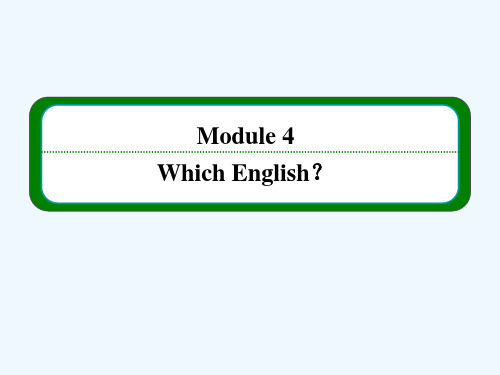
英汉对照
尽管大多数人都认为说英语有正确与错误之分,但是却没 有一种人人都认同的标准形式。几百年来,由于贸易、探险以 及商业的发展,英语已经传播到世界各地,在此进程中产生了 许多不同种类的英语。语言学教授、作家以及教师都在为提供 一种完美的模式而忧虑,但是由于英语使用如此之广,要想说 出哪种英语正确哪种不正确已经变得不可能。也许正确与否不 要紧——只要说话的人互相明白就行——重要的是交流本身。
疑难点拨
○27 or rather确切地说;说得更准确些。作插入语 ○28 过去分词短语sent there to work作prisoners的定语 ○29 由but连接的especially from ... the London area与
“from all over Britain”共同作come的状语
当你接到朋友的一个电话的时候,你要花多久才能知道对 方是谁?或许几秒钟而已。一个人的音质及措辞都能让这个人 立即被辨认出来,即使看不见是谁。从这种意义上来说,每个 人对语言的使用——不管是英语、汉语还是任何其他语言—— 都是不同的。你可以说,英语,或者其他任何语言,有多少使 用者,就有多少种变体。
○41 author/ˈɔːθə/ n.作家;作者
○42 holding a copy of the book作方式状语 ○43 and连接came up和said共同作谓语 ○44 when引导时间状语从句,he realised ... 是主句 ○45 “疑问词+不定式”结构how to spell the name作从句
疑难点拨
○37 lie in在于
○38 intonation/ˌIntəˈneIʃn/ n.语调
○39 it为形式主语,for British and American people to
高中英语人教版必修4《Reading speaking and writing》

advance v. 前进;增进;提早 The date of the meeting was advanced from June 20 to June 7.
in advance 提早,预先 Before visiting him, I called him up in advance.
2. … and giant movie screens provide brand new experiences of …
Reading (P 38)
What are the three times and three places that Futuroscope lets
you travel to?
Time
Past Present Future
Place
Earth Under sea Space
Careful reading
人教版 高中英语
Module 5 Using language (Ⅰ)
Have you ever taken part in any exciting activities?
Have you ever heard about Futuroscope?
Futuroscope is a French theme park based upon multimedia, cinematographic futoroscope and audio-visual techniques. It has several 3D cinemas along with other attractions and shows, some of which are the only examples in the world. Futuroscope has many activities: race for Atlantis, astratour, T-Rex, Children World, and the Mysteries of the Lost Temple.
高中英语 Module4 Speaking and writing课件 外研版必修2

Look at these two pictures. Can you describe them?
A boy and a girl are talking. Let’s look at what they are discussing?
1 What are the boy and girl discussing? The boy’s portrait of Paul./ Visiting an art gallery / Likes and dislikes 2 Which picture is the boy painting, picture 1 or picture 2? Say how you know this. Picture 2. Because the girl mentions the light coming through the window. 3 Why does the girl say sorry at the end of the conversation? Because she thought the picture was of Mike while it’s of nversation. Complete these sentences. 1. The girl likes the portrait because It’s realistic. It has the right ____________________________ __________. expression. 2. The girl thinks that the light coming ______ ________________________________. in through the window is very good
外研版高一英语必修第一册(2019版)-Unit4-Using-language-公开课课件

Grammar: Attributive clauses Now look for more sentences with attributive clauses in the reading passage, underline and translate them into Chinese.
On social media sites, people tend to post only positive updates that make them appear happy and friendly.
Grammar: Attributive clauses Look at the sentences from the reading passage and answer the questions.
What does “that” refer to in sentence (a)? “That” refers to “the people”.
Grammar: Attributive clauses
Look at the sentences from the reading passage and answer the questions.
b The digital age also enables us to find people who share our interests…
a We can… stay in touch with the people that we want to remain friends with. b The digital age also enables us to find people who share our interests…
外研版高中英语选修八同步检测:Module4WhichEnglish4-1(附答案)

03 课后演练提能[夯实·基础知识]Ⅰ. 单词拼写1. After a long d________,the bill was passed.答案:debate2. Each person's fingerprints are u________.答案:unique3. Tell me i________ he arrives.答案:instantly4. Our a________ settled in this country a hundred years ago.答案:ancestors5. The building was easily r________ as a prison.答案:recognisable6. Ages have left ________(痕迹) on his face.答案:traces7. She speaks a ________(方言), not the Queen's English.答案:dialect8. The new film ________(连接) up with several big ones.答案:lined9. What ________(很重要) is not your appearance but your ability.答案:counts10. It doesn't ________(要紧) much whether he will come or not.答案:matterⅡ. 选词填空agree on,instead of,as long as,lie in,tell apart,in this sense,in case,varieties of1. It is indeed rather difficult to ________ the two phrases.答案:tell apart2. ________ something unusual happens in the Olympic Village, the police will appear there at once.答案:In case3. His failure in the election doesn't ________ his work but in his attitude towards his workmates.答案:lie in4. ________ books are being sold at this bookshop.答案:Varieties of5. We should encourage them ________ throwing cold water on them.答案:instead of6. ________ bad things can be turned into good ones.答案:In this sense7. Finally, both sides ________ these terms.答案:agreed on8. It doesn't matter what you do, ________ you're happy.答案:as long asⅢ. 完成句子1. 我不能说哪个是最好的,这只是个人品味问题。
外研版选修八module4课文原文文档
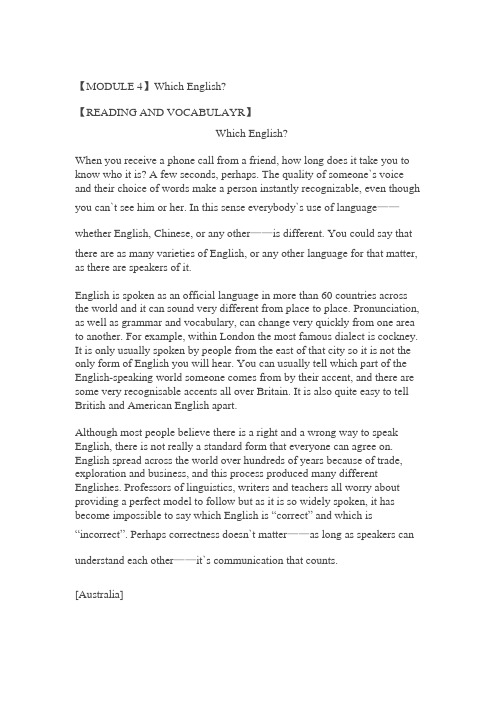
【MODULE 4】Which English?【READING AND VOCABULAYR】Which English?When you receive a phone call from a friend, how long does it take you to know who it is? A few seconds, perhaps. The quality of someone`s voice and their choice of words make a person instantly recognizable, even though you can`t see him or her. In this sense everybody`s use of language——whether English, Chinese, or any other——is different. You could say that there are as many varieties of English, or any other language for that matter, as there are speakers of it.English is spoken as an official language in more than 60 countries across the world and it can sound very different from place to place. Pronunciation, as well as grammar and vocabulary, can change very quickly from one area to another. For example, within London the most famous dialect is cockney. It is only usually spoken by people from the east of that city so it is not the only form of English you will hear. You can usually tell which part of the English-speaking world someone comes from by their accent, and there are some very recognisable accents all over Britain. It is also quite easy to tell British and American English apart.Although most people believe there is a right and a wrong way to speak English, there is not really a standard form that everyone can agree on. English spread across the world over hundreds of years because of trade, exploration and business, and this process produced many different Englishes. Professors of linguistics, writers and teachers all worry about providing a perfect model to follow but as it is so widely spoken, it has become impossible to say which English is “correct” and which is “incorrect”. Perhaps correctness doesn`t matter——as long as speakers can understand each other——it`s communication that counts.[Australia]G`day! D`ya speak Strine? Or rather, Hello! Do you speak Australian? Australia is one of the youngest nations in the world. The first Englishspeakers arrived little more than 200years ago——and they didn`t want to.Most of them were prisoners sent there to work. They came from all over Britain, but especially from Northern Ireland and the London area, which is why the Australian accent today has traces of both Irish and cockney speech patterns. The English speakers found a people who had been living inAustralia for more than 50,000 years——the Aborigines, and anextraordinary variety of wildlife, unique to the continent. Many of the Aboriginal words for these animals, such as kangaroo, koala and kookaburra soon passed into the language.But the main differences between Australian English and other intonation patterns. Sometimes it is difficult for British and American people to understand the Australian accent, and mistakes are common. A few years ago a well-known English author was signing copies of his books in a Sydney bookshop. A customer came up to the author holding a copy of the book and said Emma Chissit. The author thought that Emma Chissit was the woman`s name. But when he asked how to spell the name, in case the customer wanted him to write her name in the book (To Emma Chissit ,with best wishes), he realized that the customer had been asking the question: How much is it?[Jamaica and Singapore]Australian English comes directly from English spoken in Britain. But in other countries where English is spoken as a first language this is not the case. The variety of English spoken in Jamaica, and other Caribbean countries, has some of the grammatical features of the African languages spoken by the ancestors of the Jamaican people, so that there is often no apostrophes(`s) (that woman house, instead of that woman`s house) or no link verb or article(He good man, instead of He`s a good man). Another feature is the rhythm. It is the rhythm of rap music, which became popular in the US in the 1980s.On the other side of the world, in Singapore, English is a second language, spoken by about half the population. Other languages include Malay and Chinese. Almost everyone in Singapore is bilingual, while some people speak three or four languages. The most common variety of English spoken is known as Singlish. Sentences in Singlish often end with the world lah.The variety has been influenced in particular by Malay and the Chinese dialect Hokkien (language spoken in Minnan), both in grammatical features and vocabulary. Today there is a debate in Singapore about which variety of English is the best: Singlish, or a variety closer to British English, which is the aim of the Speak Good English Movement created in 1999. 【READING AND VOCABULARY】The Future of EnglishEver since the invention of the first telegraph at the end of the 19th century, English has been spreading around the world. It has a power influence in the media, on the Internet and in pop music that is not going to go away. This communication revolution has turner the world into a “global village” inwhich everyone needs to talk to each other—and so often nowadays thatmeans in English.More people now speak English as a second language across the world than as a native language. It is estimated that 1.3 billion people will use English as either a first or a second language by 2050. But what will that form of English be like? Traditionally, British English has been taught across the world, but it is only one variety. Experts believe that the future shape and grammar of English, especially in its spoken form, will no longer be determined in the traditional English-speaking countries like Britain and America but in the rest of Europe, Asia and Africa.International organizations and businesses communicate with each other in English. But a new pattern of using English is developing that does not look the same to native speakers as “traditional” English. Researchers are now investigating “non-native” English which is a new form of the language with changes in grammar, pronunciation and meaning. Often meanings and words from other languages find their way into English to produce a new dialect such as “Franglais” which combines aspects of French and English. You could say this gives English a French flavour. All of those processes are a form of natural evolution. New dialects acquire their own complex features until they become real languages in their own right. Experts are convinced that this will happen in the future as more and more people learn English and call it their own.【READING PRACTICE】Colourful EnglishEnglish has a huge number of colourful and splendid expressions which may be difficult to understand. Even if the meaning of the words is straightforward, the cultural associations of the phrase may be ambiguous. The dilemma is to know which are explicit, which are figurative, and why they are relevant to an everyday situation.Idioms are picturesque or absurd expressions conveying a concept which is different from the literal meaning and have been common in English for many years. The Pilgrim Fathers in America always asked for turkeys when they traded with Native Americans. Thus, to talk turkey means to get down to business. But some idioms are very new and you`ll need to clarify what they mean. For example, man as a box of frogs is a recent way of describing someone who has a tendency to be rather disorganized or vague. A bad hair day is one when you fell clumsy or depressed, possibly because your hair doesn`t look good.Many expressions are advertising slogans. That`ll do nicely, sir! comes from an old TV ad for American Express. It`s the shop assistant`s reply to a customer who selects a credit card from his wallet and asks if the shop accepts American Express.Other common expressions have metaphorical significance. Get your tanks off lawn! means Back off! Withdraw your threats! and was first said by a British prime minister, rejecting the threat of a potential strike by a trade union leader. Age before beauty is used when inviting another person to go through a door before you. It`s not meant to abuse the other person, but it may sometimes cause offence. The Iron Curtain was the statesman Winston Churchill`s term for the diving line between eastern and western Europe. With friends like these, who needs enemies? means a friend has betrayed your trust or let you down. We shall overcome dates from the American Civil Rights movement in the USA, meaning we will oppose prejudice against black people and resist conflict between Americans.Finally, there are traditional proverbs which express a moral or piece of advice. For example, when in Rome, do as the Romans do suggests you should adapt to local conditions. Some sayings have achieved the superior status of a proverb such as Money makes the world go around from themusical Cabaret(1996). This comes from the older proverb Love makes the world go round.【CULTURAL CORNER】Chinese as a Foreign LanguageWho wants to learn Chinese? Just about everybody in the world, it seems. The demand for Chinese as a foreign language is growing fast, both in English-speaking countries like France, where the number of students studying Chinese has increased by 15% each year in recent years.There are a number of reasons for the interest. As China develops economically, opportunities for doing business increase dramatically——and if you know your partner`s language, your chances of success increase. But there is also a renewed interest in the culture and traditions of China; the fact that Chinese culture has continued uninterrupted for more than 5,000 years is a source of curiosity and fascination for people in other parts of the world.A third reason is that learning Chinese is, simply, a challenge. With its characters and complicated tone system, most speakers of other languages think Chinese must be the incredibly difficult. But is it really so? As one American students says, “The biggest problem about learning Chinese is often fear——sometimes caused by the teachers. I`ve studied quite a fewlanguages, and none of them are as easy for me as Chinese. The grammar is easy, since sentence order is similar to English——but simper. The only difficult part of spoken Chinese is the tone system. Even that isn`t a big problem. I remember the first time I heard a native of Beijing speaking, it was so clear!”With so much interest in the language ,the Chinese government introduced an international exam system.Established in 1990,the HSK test was initially meant for those learners who regard Chinese as a second or foreign language. Later, it was introduced abroad. At the moment, there are more than 100 exam centres in 27countries around the world, with nearly 15,000 candidates taking the exam every year. And a spin-off of this is that teaching Chinese as a foreign language offers young Chinese language graduates interesting professional opportunities——and a chance to travel across the world.。
高中英语 Module 4 Which EnglishSection Ⅱ Grammar课后演练提能
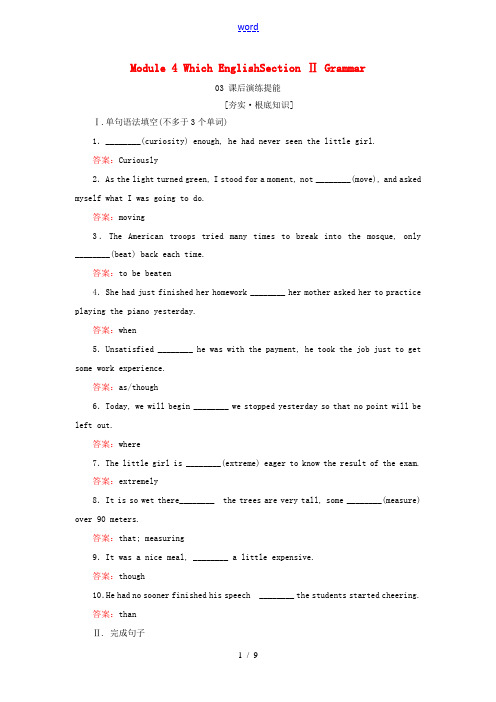
Module 4 Which EnglishSection Ⅱ Grammar03 课后演练提能[夯实·根底知识]Ⅰ.单句语法填空(不多于3个单词)1.________(curiosity) enough, he had never seen the little girl.答案:Curiously2.As the light turned green, I stood for a moment, not ________(move), and asked myself what I was going to do.答案:moving3.The American troops tried many times to break into the mosque, only ________(beat) back each time.答案:to be beaten4.She had just finished her homework ________ her mother asked her to practice playing the piano yesterday.答案:when5.Unsatisfied ________ he was with the payment, he took the job just to get some work experience.答案:as/though6.Today, we will begin ________ we stopped yesterday so that no point will be left out.答案:where7.The little girl is ________(extreme) eager to know the result of the exam.答案:extremely8.It is so wet there________ the trees are very tall, some ________(measure) over 90 meters.答案:that; measuring9.It was a nice meal, ________ a little expensive.答案:though10.He had no sooner finished his speech ________ the students started cheering.答案:thanⅡ. 完成句子1.正如所报道的那样,自从清华大学建校以来已有100多年时间了。
外研版高中英语选修四第一单元逐字稿

外研版高中英语选修四第一单元逐字稿一、单元主题概述本单元的主题是“旅行与冒险”。
课文通过讲述一群高中生的冒险旅程,引导我们关注青春期的友谊、勇气和责任。
故事情节丰富,涉及文化、历史、地理等多方面的知识,为我们展示了一个充满挑战与惊喜的旅行世界。
二、重点词汇和短语1.词汇:探险(expedition)、遗址(ruins)、背包(backpack)、导游(guide)、留恋(linger)、陶器(pottery)等。
2.短语:尽情享受(enjoy oneself)、奋发向前(strive forward)、疲惫不堪(exhausted)等。
三、语法要点本单元的语法重点是现在进行时和现在完成时的用法。
现在进行时表示现在正在进行的动作,如:We are having a great time.(我们玩得很开心。
)现在完成时表示从过去某个时间开始持续到现在的动作,如:We have been to many places.(我们已经去过很多地方。
)四、实用对话和句型1.询问和建议:- A: What should we do tomorrow?B: We can go on an excursion to the mountains.2.描述行程:- A: How was your trip to the museum?B: It was really interesting.We saw a lot of ancient artifacts.3.表达感受:- A: Are you tired?B: Yes, I"m exhausted.I need a rest.五、练习与作业建议1.完成课本上的练习题,巩固本单元的知识点。
2.模拟对话,与同学或家人用英语讨论旅行经历。
3.查阅资料,了解我国或其他国家的著名旅游景点和文化特色。
通过本单元的学习,我们不仅可以提高英语水平,还能拓宽视野,激发对旅行的向往。
- 1、下载文档前请自行甄别文档内容的完整性,平台不提供额外的编辑、内容补充、找答案等附加服务。
- 2、"仅部分预览"的文档,不可在线预览部分如存在完整性等问题,可反馈申请退款(可完整预览的文档不适用该条件!)。
- 3、如文档侵犯您的权益,请联系客服反馈,我们会尽快为您处理(人工客服工作时间:9:00-18:30)。
Which English--Speaking-Reading and V ocabulary (2)-Writing-Task 教案(外研版选修8 module4)
Step1. Revision:
Let the students explain the words and phrases in Everyday English Step2. Reading and V ocabulary (2)
Activity 1 on page 51.Read the passage and find
Three sentences that tell you facts:
Three sentences that give you someone’s opinion:
(1.) Ask the students to do these sentences individually, and then check with their partners.
(2) Call back the answers from the whole class;
(3)The teacher tells the students the correct answers.
Activity 2 on page 51. Work in pairs and answer the questions (1.) Ask the students to do these sentences individually, then check with their partners.
(2) Ask the students to answer the questions, having one student ask
a question
and another answer.
Step3 Main language points in the text.
1. It is estimated that 1.3 billion people will use English as either a first or a second language by 2050.
It is estimated that…据估计….it为形式主语,指代引导的从句.
It is estimated that more satellites will be sent up into space for scientific purposes.
2. Acquire
1.) 得, 得到, 获得; 招致
The museum has just acquired a famous painting by Pablo Picasso. 该美术馆刚刚获得一幅毕加索的名画。
She has mastered English grammar and acquired a large vocabulary without the help
of a teacher.
她在没有老师指导的情况下,掌握了英语语法,学到了大量词汇。
Gradually we acquired experience in how to do the work.
我们逐步获得了做这工作的经验。
2.)学得(知识等), 求得, 养成(习惯等)
We must work hard to acquire a good knowledge of English.
我们必须用功学习才能精通英语。
3. convince
(1.) 使相信[信服],说服
I was convinced that he knew the truth.
我确信他知道事实。
He convinced me of his innocence.
他使我相信他是无辜的。
(2.) 使承认;使悔悟;使认错[罪]
We convinced Anne to go by train rather than plane.
我们说服了安妮放弃乘飞机而坐火车走。
convince sb. by sound arguments
以理服人
He was convinced of his error.
他认识了错误
convince sb. of sth.
使某人相信某事
convince sb.
说服某人
Step4. Writing
Activity 1 on page 52.Read the following statement:
“It would be much easier if everyone in the world just spoke English.”
Do you agree? Why/ Why not?
1. Ask the students to think about this individually, then share their ideas with a partner.
2. Call back some ideas from the whole class and make notes about your ideas.
Activity2 Match the expressions with their meanings
(1.) Ask the students to do these sentences individually, then check with their partners.
(2) Ask the students to answer the questions, reading the complete sentences.
(3)The teacher tells the students the correct answers.
Step5. Task
Activity 1 on page 56 work in groups and discuss the questions How many characters do you think there are in Chinese?
How many characters do you know?
How many words do you think there are in English?
How many English words do you think you know?
Do you know any English words that are used in Chinese?
Do you know any Chinese words that are used in English?
Activity 2 on page 56 Read the words in the box. Say what they have in common, then write the words in Chinese.
Step7. Homework
Write a composition giving your ideas on Writing on P52。
